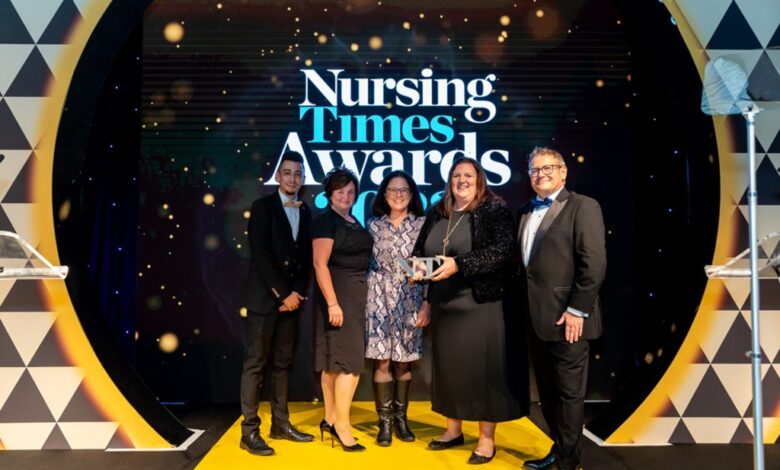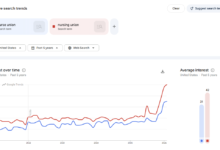Nursing Times Awards highlights: Technology and Data in Nursing

Spotlight on excellence: We wanted to tell you more about how technology and data initiatives are being recognised at the Nursing Times Awards and why it’s such an important category.
Below you will find out more about the Technology and Data in Nursing category, which features each year at the Nursing Times Awards, including the criteria that entrants must meet and what the judges are looking for in the finalists and winners.
You will also find information on last year’s winner and finalists, with summaries of their projects and innovations. We hope you are inspired to enter or support the category in other ways.
Category criteria – Technology and Data in Nursing
In community healthcare, nurses face unique challenges, working independently with limited resources.
This award in Technology and Data in Nursing welcomes entries from the NHS or independent sector, focusing on improvements in patient care and service effectiveness with measurable outcomes.
Initiatives entered in this category may include facilitating successful community discharges, expanding home care boundaries, and increasing service uptake among hard-to-reach groups.
Sponsor this category to meet all the finalists: download the awards media pack
Enter this award: register your interest for 2024
What the judges are looking for?
Emphasizing the importance of technology and data in nursing, the criteria include:
Innovative:
- Originality and uniqueness of the proposed idea
- Value: Impact on patient care or service effectiveness
How the entries are judged ?
Each entry undergoes rigorous evaluation against criteria including:
- Measurable: Data demonstrating clinical or service improvements
- Leadership: Evidence of nurse-led initiatives
- Transferable: Potential for ideas to be adopted by others
- Evidence: Substantiated measures of success or efficacy
Find out more about our 2023 Technology and Data in Nursing winner
WINNER – North West Neonatal Operational Delivery Network
Creation of a digital neonatal parent passport
Many neonatal units issue Parent Passports that include information and checklists for parents to ensure they are confident partners in their baby’s care.
These were paper based so there was little consistency between units or networks, and families often had to fill out extra forms when transferred, which were easily lost.
Digitising the passport using the vCreate app made it consistent and accessible at any time, on any device. In addition, the auto-translation feature helped bridge the language barrier for non-English speaking families, bringing greater equity of access.
Parents can explore the information and learn new skills at their own pace. One parent said it would “transform the neonatal journey.”
What the judges said about the winner
The judges chose this winning entry because of the significant positive and lasting impact on the parents of babies at a critical time. The solution supports parents to have autonomy to provide direct care for their baby in an unexpected environment.
The digital neonatal parent passport enables continuity for parents to care for their baby where there are transfer of care between neonatal units.
What the winners said themselves about the experience
Find out about the 2023 finalists for Technology and Data in Nursing
Canford Healthcare – Harnessing technology for outstanding governance
A digital governance system facilitates auditing, identifies trends and issues, records and shares information, and identifies and plans training needs. Staff spend less time on administration and have more time to care, which has led to better outcomes for residents.
Lancashire and South Cumbria NHS Foundation Trust – The recovery and discharge planning tool
Patients worked towards discharge but there was a lack of awareness of barriers and what treatment was outstanding. A discharge readiness tool was launched, which identified early on an estimated discharge date, goals and potential barriers. Its use resulted in reduced length of stay and joined-up working, which improved the patient journey.
Leicestershire Partnership NHS Trust – Digital health and wellbeing forms
An online confidential questionnaire was created to provide health information to young people and identify those needing further intervention. Red flag questions/words enabled school nursing teams to triage responses. More than 8,000 forms were completed, nearly half of which revealed at least one red flag.
Mersey Care NHS Foundation Trust – Preceptorship team
The team developed an app that helps with the completion of competency paperwork. It also features wellbeing resources, clinical skills support, quick guides and a mood-check function that enables support and advice to be offered when needed. More than 57,000 user interactions have been achieved.
Milton Keynes University Hospital NHS Foundation Trust – Wisdom of patients
An online platform to rate, theme and give a dashboard display of qualitative data from patient feedback was designed. The dashboard enabled staff to access feedback by area, compare it against other areas and hospitals, and thoroughly analyse the data. In one year, 56,401 pieces of feedback were analysed.
Milton Keynes University Hospital NHS Foundation Trust – Digital Twin
A digital replica ward using Internet of Things sensors and a real-time locating system was introduced to improve care and staff productivity on single-room wards. Collecting data on room occupancy, the location of critical medical equipment and people’s movements allowed staff to view and react to events instantly, without disturbing patients.
The Newcastle upon Tyne Hospitals NHS Foundation Trust – Digital pre-assessment for cancer patients
The aim of the group digital preassessment was to ensure all patients due to start chemotherapy and/or immunotherapy received standardised information. Videos were also produced so information was readily available and could be accessed repeatedly. Patients considered the initiative invaluable.
NHS Ayrshire and Arran – Improving timely administration of Parkinson’s medications in hospital
Electronic prescribing and ward whiteboard systems were combined so the medication of Parkinson’s patients’ could be managed, monitored and audited across different departments. The initiative led to greater in-time medication administration.
Rotherham, Doncaster and South Humber NHS Foundation Trust – Children’s care group
Referrals to mental health services for young people and waits for assessment had increased following the Covid-19 pandemic. A pilot was launched and 40 people were referred for therapy via virtual reality. Initial feedback from service users and staff has been positive.
The Shrewsbury and Telford Hospital NHS Trust – App for cancer information, support and wellbeing
An app was launched to help patients with cancer find information on new initiatives and relevant support at anytime, anywhere. An analytics package allows staff to track the daily number of downloads, users and views. More than 61,600 user interactions were recorded.
University of Salford – The Salford outbreak management tool
The Infection Control Estimate digital tool was developed to support the management of outbreaks of communicable disease. Following testing of a prototype, funding was secured to develop web-based software and feedback has been positive.






